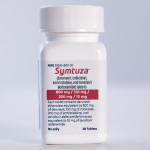Generic Name: darunavir
Abbreviation: DRV
Drug Class: Protease Inhibitors (PIs)
Company: Janssen Therapeutics
Approval Status: Approved
Generic Version Available: No
Drug Indication
A component of recommended and alternative treatment regimens for antiretroviral-naive people living with HIV, as indicated by the U.S. Department of Health and Human Services (DHHS) Panel on Antiretroviral Guidelines for Adults and Adolescents. Visit https://aidsinfo.nih.gov/guidelines/html/1/adult-and-adolescent-arv-guidelines/0 for the full DHHS guidelines.
General Info
Prezista is an HIV medication. It is in a category of HIV medicines called protease inhibitors. Prezista was approved by the U.S. Food and Drug Administration for use by people living with HIV in October 2008.
Prezista must be combined with either Norvir (ritonavir) or Tybost (cobicistat) and other HIV drugs. For use in combination with cobicistat, the fixed-dose combination tablet Prezcobix is available.
Dosage
Adult Dose: One 800 mg tablet (or two 400 mg tablets) plus one 100 mg Norvir tablet once a day OR one 600 mg tablet plus one 100 mg Norvir tablet twice a day, depending on evidence of drug resistance.
Pediatric Dose: Age 3 to 18 years old: dosing based on body weight and should not exceed the adult dose
Dosing Info: Take with food. If taken with ddI (Videx or Videx EC), Prezista/Norvir should be taken at least two hours before or one hour after taking ddI.
Side Effects
Common side effects associated with Prezista-based regimens include diarrhea, nausea, headache, and abdominal pain.
Rash is another common side effect of Prezista. If a severe rash occurs while taking Prezista, contact your health care provider immediately. Prezista is a sulfa-containing drug and should be used with caution in patients with a known sulfa allergy.
Some people may experience increases in their lipid levels (triglycerides and cholesterol) or diabetes risk while being treated with protease inhibitors. These problems are much less common with duranavir-based regimens compared with most other protease inhibitors.
Drug-induced hepatitis (liver injury) has been reported in people taking protease inhibitors. This usually occurred in people who had extremely low CD4 cells, were taking multiple other medications and who were also infected with hepatitis B virus (HBV) or hepatitis C virus (HCV). Lab tests to monitor liver function is an important component of routine follow-up care and important for people using protease inhibitors.
Drug Interactions
The following medications should not be taken while you are being treated with Prezista:
Acid reflux/heartburn medications: Propulsid (cisapride)
Antibiotics: Rifadin (rifampin)
Antimigraine medications: Methergine, Methylergometrine (methylergonovine); Ergostat, Cafergot, Ercaf, Wigraine (ergotamine); Ergotrate, Methergine (ergonovine); or D.H.E. 45, Migranal (dihydroergotamine)
Anti-gout: Colcrys (colchicine)
Cholesterol-lowering drugs (statins): Zocor (simvastatin) and Mevacor (lovastatin)
Heart medications: Ranexa (ranolazine) and Multaq (dronedarone)
Antipsychotics: Latuda (lurasidone) and Orap (pimozide)
Sedatives: Versed (midazolam) and Halcion (triazolam)
Enlarged prostate: Uroxatral (alfuzosin)
Pulmonary Hypertension: Revatio (sildenafil)
Herbal products: St. John’s wort
Important hepatitis C treatment drug-drug interactions: Norvir-boosted Prezista can be combined with Sovaldi (sofosbuvir), Harvoni (ledipasvir/sofosbuvir), ribavirin, and pegylated interferon alfa. Do not use with Olysio/Sovriad (simeprevir) or Viekira Pak (ombitasvir/paritaprevir/ritonavir/dasabuvir).
Prezista, particularly when combined with the boosting agents ritonavir or cobicistat, can increase the levels of many other drugs in the body, potentially increasing the risk of serious side effects. Dosage adjustments or substitutions may be necessary if you are prescribed certain medications from any of the following drug classes: antiarrhythmics, antibiotics, cancer chemotherapeutic drugs, anticoagulants, anticonvulsants, antidepressants, antifungals, anti-gout medications, antimalarial drugs, beta-blockers, calcium channel blockers, corticosteroids (oral and inhaled), endothelin receptor antagonists, hepatitis C medications, statins, hormonal contraceptives, immune-suppressants, inhaled beta agonists, narcotic medications (for pain and opioid dependence), neuroleptics/anti-seizure medications, erectile dysfunction drugs, and sedatives/hypnotics. Consult the Prezista package insert for more details: http://www.prezista.com/sites/default/files/pdf/us_package_insert.pdf#zoom=100
Other Info
Before taking this medication, tell your doctor if you have kidney disease or liver disease (including hepatitis B). In addition, tell your doctor if you are pregnant or planning to become pregnant, if you are breast feeding, and all your medical conditions, including all prescription and over-the-counter medications and supplements you are taking.
For More Info: http://www.prezista.com/sites/default/files/pdf/us_package_insert.pdf#zoom=100
Co-Pay Program Info: https://www.poz.com/basics/hiv-basics/drug-assistance-programs
Patient Assistance Program Info: https://www.poz.com/basics/hiv-basics/drug-assistance-programs
Last Reviewed: May 11, 2020






